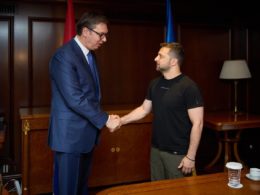A new study titled "Russia: Paving the way for autocracies - How the Kremlin is destabilizing Europe" reveals Moscow's extensive influence operations across Europe, Spiegel reported on 14 January.
Thomas Brey, former correspondent of the German news agency dpa in Belgrade, authored the study showing how the Kremlin adapts its influence strategy to regional characteristics across Central and South-Eastern Europe. The primary goal, according to the research, is establishing an "axis of autocrats" within EU and NATO members and aspirant states.
The study identifies Hungary's Viktor Orbán as the "linchpin" of autocratic trends in Europe. Spiegel says that Orbán, who has ruled since 2010, serves as Moscow's central agent within the EU, blocking Ukraine aid. His gradual undermining of democratic foundations in Hungary serves as a blueprint for other pro-Russian politicians, such as Slovak Prime Minister Robert Fico and FPÖ leader Herbert Kickl, who aspires to the Austrian chancellorship.
"The quasi autocrat in Budapest seeks to close ranks with Serbia's Vučić and courts the Bosnian-Serbian separatist Milorad Dodik, against whom the USA has imposed sanctions. If necessary, Orbán even grants "political asylum" in Hungary to like-minded people who are being prosecuted in their home country: the former North Macedonian prime minister Nikola Gruevski, for example, or the former Polish deputy justice minister Marcin Romanowski," Spiegel wrote.
In Slovakia, Kremlin propagandists successfully reframed a May assassination attempt on PM Fico as an attack on pro-Russian positions, the study revealed. Recent developments show deepening ties, with Slovakian parliamentarians praising Putin in Moscow and anticipating meetings with Russia's Foreign Minister Sergei Lavrov.
Serbian media, particularly through "Sputnik Serbia" and "RT Balkan," promotes anti-EU narratives despite the EU being Serbia's primary source of aid and investment. During a September visit to Saint Petersburg, Serbia's Deputy Prime Minister Aleksandar Vulin made inflammatory anti-German statements, reflecting growing anti-Western sentiment.
The study also highlights concerning developments in other regions:
- Russian military bloggers conducted social media training in Bosnia and Herzegovina
- Croatia's President Zoran Milanović faces accusations of spreading Russian propaganda
- Bulgaria's pro-Russian president and Romania's political instability show growing Kremlin influence
- Former North Macedonian Foreign Minister Bujar Osmani warned about Russian disinformation destroying "the social fabric of society"
The FNS study concludes that Russian state propaganda has already caused "immense socio-political damage," citing declining journalism quality and voters' diminishing ability to critically evaluate news.
Related:- Slovak opposition to launch vote of no-confidence vote after Fico’s pro-Moscow gas claims
- “Let’s meet at Ukraine border and discuss Russian gas,” Slovak PM says. “Come to Kyiv on Friday,” Zelenskyy replies
- Proposed law may terminate Russian Orthodox Church operations in Estonia
- US Treasury sanctions Hungarian official, straining NATO alliance
- Hungary blames Ukraine for EU gas price surge after Russian transit halt
- Ukrainian opposition introduces bill to ban Russian oil transit
- Politico: Russian gas cutoff leaves Slovakia stable despite Fico’s fearmongering
- Ukraine condemns Pan-African Parliament members’ trip to occupied Donetsk
- Putin reaffirms war goals, rules out a ceasefire in Ukraine, Vučić says





